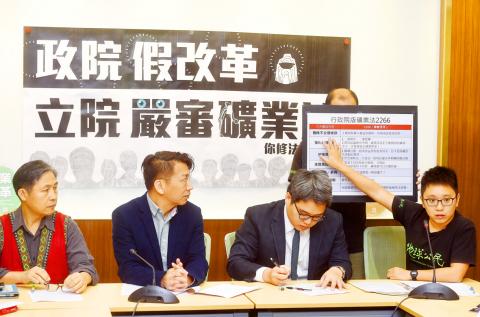Environmental groups yesterday called on members of the legislature’s Economics Committee to rework the draft amendments to the Mining Act (礦業法) to prevent mining corporations from exploiting Aboriginal property.
While many lawmakers proposed their drafts in previous legislative sessions, the Executive Yuan published its draft on Dec. 7, sparking criticism from many lawmakers and environmentalists over its content.
The Cabinet’s draft is more regressive than the one proposed in July by the Bureau of Mines, Citizen of the Earth, Taiwan consultant Tsai Chung-yueh (蔡中岳) told a news conference before the meeting, adding that Democratic Progressive Party (DPP) lawmakers are allegedly planning to rush it through.

Photo: Chien Jung-fong, Taipei Times
Regarding Article 13, the Cabinet proposed that miners applying for mining permit extensions should undergo a new environmental impact assessment conducted by the Environmental Protection Administration (EPA).
However, the draft does not require miners to stop their operations during the assessment, New Power Party Legislator Hsu Yung-ming (徐永明) said, adding that the Ministry of Economic Affairs is the agency that determines whether a mining project can be extended.
The EPA has been reduced to a subsidiary of the ministry, which would be given unduly administrative power to make decisions about mining projects, he said.
The act should not cater to the needs of Asia Cement Corp, Hsu said, urging lawmakers who have received donations from cement makers to withdraw from the review to avoid conflicts of interest.
The Cabinet proposed a new article, 43-2, that would require miners applying for a permit extension to observe the Indigenous Peoples Basic Act (原住民族基本法) by submitting documents to prove that local Aborigines have agreed to or joined their project.
However, this would mean that their approval is not necessary, Citizen of the Earth, Taiwan researcher Huang Ching-ting (黃靖庭) said.
The government only respects Aborigines when it needs them to perform in big events, but as for their rights to land and natural resources, it can find all kinds of excuses to exploit their property, Legal Aid Foundation lawyer Hsieh Meng-yu (謝孟羽) said.
Regulations regarding Aborigines’ approval and the extension of mining permits were among the most hotly debated subjects during the meeting.
As lawmakers could not reach consensus about many articles, DPP Legislator Chiu Chih-wei (邱志偉), the committee convener, said that the review is to continue tomorrow and on Thursday if necessary.

ANOTHER EMERGES: The CWA yesterday said this year’s fourth storm of the typhoon season had formed in the South China Sea, but was not expected to affect Taiwan Tropical Storm Gaemi has intensified slightly as it heads toward Taiwan, where it is expected to affect the country in the coming days, the Central Weather Administration (CWA) said yesterday. As of 8am yesterday, the 120km-radius storm was 800km southeast of Oluanpi (鵝鑾鼻), Taiwan’s southernmost tip, moving at 9kph northwest, the agency said. A sea warning for Gaemi could be issued tonight at the earliest, it said, adding that the storm is projected to be closest to Taiwan on Wednesday or Thursday. Gaemi’s potential effect on Taiwan remains unclear, as that would depend on its direction, radius and intensity, forecasters said. Former Weather Forecast

As COVID-19 cases in Japan have been increasing for 10 consecutive weeks, people should get vaccinated before visiting the nation, the Centers for Disease Control (CDC) said. The centers reported 773 hospitalizations and 124 deaths related to COVID-19 in Taiwan last week. CDC Epidemic Intelligence Center Director Guo Hung-wei (郭宏偉) on Tuesday said the number of weekly COVID-19 cases reported in Japan has been increasing since mid-May and surpassed 55,000 cases from July 8 to July 14. The average number of COVID-19 patients at Japan’s healthcare facilities that week was also 1.39 times that of the week before and KP.3 is the dominant

The Chinese Communist Party’s (CCP) working group for Taiwan-related policies is likely to be upgraded to a committee-level body, a report commissioned by the Mainland Affairs Council (MAC) said. As Chinese President Xi Jinping (習近平) is increasingly likely to upgrade the CCP’s Central Leading Group for Taiwan Affairs, Taiwanese authorities should prepare by researching Xi and the CCP, the report said. At the third plenary session of the 20th Central Committee of the CCP, which ended on Thursday last week, the party set a target of 2029 for the completion of some tasks, meaning that Xi is likely preparing to

US-CHINA TRADE DISPUTE: Despite Beijing’s offer of preferential treatment, the lure of China has dimmed as Taiwanese and international investors move out Japan and the US have become the favored destinations for Taiwanese graduates as China’s attraction has waned over the years, the Ministry of Labor said. According to the ministry’s latest income and employment advisory published this month, 3,215 Taiwanese university graduates from the class of 2020 went to Japan, surpassing for the first time the 2,881 graduates who went to China. A total of 2,300 graduates from the class of 2021 went to the US, compared with the 2,262 who went to China, the document showed. The trend continued for the class of 2023, of whom 1,460 went to Japan, 1,334 went to